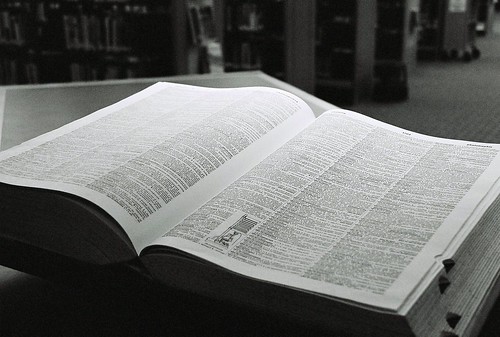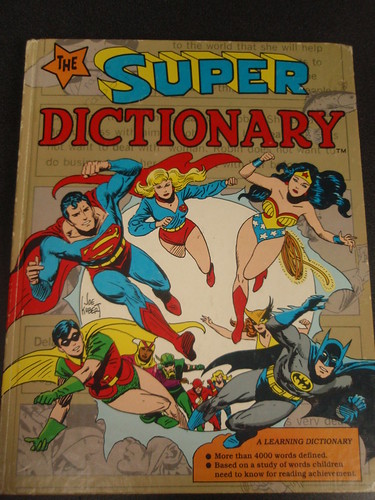Welcome to Word Soup Wednesday, in which we bring you some strange, obscure, unbelievable (and sometimes NSFW) words from talk shows, sitcoms, dramas, and just about anything else on TV.
This week’s roundup includes two anachronisms.
beat the Dutch
Andrew: “Now don’t that beat the Dutch.”
“The Hudson River School,” Copper, September 20, 2012
To beat the Dutch means “to surpass everything,” or “say [or do] something incredible.” The idiom originated around 1775, says the OED.
The origin is unclear but, according to this publication from 1887, the phrase may come from the idea of “a fancied superiority of the English settlers in wit and quickness,” and is “in fact, a good-natured way of making fun of the descendants of the Dutch colonists,” though one may question the “good-naturedness” of such a phrase.
boot
Ron: “If you need to boot again, trash can’s on your right.”
“Soda Tax,” Parks and Recreation, September 27, 2012
Boot is slang for “vomit.” Boot and rally means “to vomit (‘boot’) due to over-consumption of alcohol, and then continue partying (‘rally’).” This phrase seems to have originated in the late 1980s as campus slang.
critical mass
Lisa [regarding a black hole]: “If one more thing gets in there, it could reach critical mass!”
“Treehouse of Horror XXIII,” The Simpsons, October 7, 2012
Critical mass in this context refers to “the amount of matter needed to generate sufficient gravitational force to halt the current expansion of the universe,” and is attested to 1940. Critical Mass is also a cycling event.
Dixiecrat
Leslie: “Councilman Milton was first elected as a city councilor in 1948 as a member of the Dixiecrat party. Their platform? De-integrate baseball.”
“How a Bill Becomes a Law,” Parks and Recreation, October 4, 2012
A Dixiecrat is “a member of a dissenting group of Democrats in the South who formed the States’ Rights Party in 1948.” According to the Oxford English Dictionary (OED), Dixiecrats seceded “because they opposed [the Democratic party’s] policy of extending civil rights.”
The word is a blend of Dixie, “a region of the southern and eastern United States, usually comprising the states that joined the Confederacy during the Civil War,” and Democrat.
dog’s bollocks
Owen: “Aren’t you the dog’s bollocks?”
Roland: “Is that a good thing?”
“Blue Bell Boy,” Boardwalk Empire, October 7, 2012
Anachronism alert! While bollocks meaning “nonsense” originated in 1919, says the Online Etymology Dictionary, the first recorded use of dog’s bollocks, meaning “the very best,” wasn’t until the mid to late 1980s. Dog’s bollocks referring to, in typography, “a colon followed by a dash” (said to resemble the male sexual organs) is attested to 1949, according to the OED.
Dog’s bollocks meaning “the best” is a play on similar terms from the 1920s, says the Online Etymology Dictionary, such as the bee’s knees, the cat’s pajamas, and the cat’s meow.
drygulch
Jake: “He drygulched me.”
Al Capone: “He hit you when you wasn’t looking?”
“Blue Bell Boy,” Boardwalk Empire, October 7, 2012
Another anachronism! Drygulch, which means “to murder; to attack, assault, especially in an ambush,” didn’t come about until 1930, according to The Concise New Partridge Dictionary of Slang, almost 10 years after this episode takes place.
The origin of the word is uncertain. It may come from the idea of the ambusher hiding in a dry gulch or ravine and jumping out a passerby, or perhaps from the idea of being taken by surprise by a flash flood caused by heavy rain filling a dry ravine.
DWB
Larry Wilmore: “Racism works best in person. Distrust but verified.”
Jon Stewart: “Like a cop pulling you over for a DWB.”
Larry: “I’m sorry, what’s that, Jon?”
Jon: “A DWB, you know. . .Driving While Black.”
The Daily Show with Jon Stewart, October 2, 2012
DWB, or driving while black, “refers to the racial profiling of black drivers.” The phrase is a play on DWI, “driving while intoxicated,” and originated in 1990 in a New York Times article, says the OED.
Etch A Sketch
News commentator: “Mitt Romney presented us with the ultimate Etch A Sketch behavior last night.”
The Colbert Report, October 4, 2012
An Etch A Sketch is a drawing toy which one merely shakes to erase. Mitt Romney’s behavior is described as Etch a Sketch due to his tendency to express opinions that are contradictory to his opinions in the past.
Romney was first likened to the toy by his own senior campaign adviser, Eric Fehrnstrom: “[Romney’s campaign is] like Etch A Sketch. You can shake it up and we start all over again.”
menstruation
Nun: “Monthly time.”
Margaret: “You are at odds with menstruation?”
Dr. Mason: “It’s good Latin.”
Nun: “A regrettable neologism.”
“Blue Bell Boy,” Boardwalk Empire, October 7, 2012
Menstruation was actually not a neologism during the time of this episode, the early 1920s, but originated in the 1680s. Regarding another “problematical” word, pregnant, the sister had this suggestion: “Gravid has a noble ring.” Gravid comes from the Latin gravis, “heavy.”
pip and a half
George’s boss: “I gotta say, you’re a pip and a half.”
“Bone for Tuna,” Boardwalk Empire, September 30, 2012
You’re a pip is a British idiom that means, depending on the context, You’re a sweetheart, a pain in the neck, or a real character, according to a commenter on this Word Detective post on pip. A pip and a half is, presumably, even more so of a character.
If anyone has any additional information on this expression, please let us know.
Seelengut
Nick: “It’s interesting finding a Blutbad leading a flock of – ”
Pastor: “Seelenguten, Detective.”
“The Good Shepherd,” Grimm, September 28, 2012
Seelengut, a sheep-like creature that can take on human form, translates from the German as “good soul.” A blutbad is a werewolf type creature and translates from the German as “blood bath.”
straw poll
Leslie: “Let’s take a quick straw poll. Hold up green if you agree and red if you disagree.”
“Soda Tax,” Parks and Recreation, September 27, 2012
A straw poll is a casual or ad hoc survey. The phrase originated originated around 1932, says the Online Etymology Dictionary, as did straw ballot. Older is straw vote, which came about in 1866 and, according to William Safire et al, “may allude to a straw (thin plant stalk) held up to see in what direction the wind blows, in this case, the wind of group opinion.”
white horse
Maw Maw: “By the way, if you’re going with the white horse, I think I can get that for you. We’re talking about heroin, right?”
“Not Indecent, But Not Quite Decent Enough Proposal,” Raising Hope, October 2, 2012
White horse, or horse, is slang for heroin or cocaine. Horse referring to heroin originated around 1950. The word heroin originated in 1898 from the German Heroin, a trademark “registered by Friedrich Bayer & Co. for their morphine substitute.”
zinger
News announcer: “Mr. Romney’s team has concluded that debates are about creating moments and has equipped him with a series of zingers that he has memorized and has been practicing on aides since August.”
Jon Stewart: “You’ve equipped him with zingers. And you know I find the best zingers are the ones you practice for two months.”
The Daily Show with Jon Stewart, October 1, 2012
A zinger is “a witty, often caustic remark.” The word originated around 1970 and was earlier “baseball slang for ‘fastball’ (by 1957).”
That’s it for this week! If you have any additional information on these words, especially the anachronisms, please let us know. And remember, if you see any Word Soup-worthy words, tweet it on Twitter with the hashtag #wordsoup. Your word and Twitter handle might appear right here!

